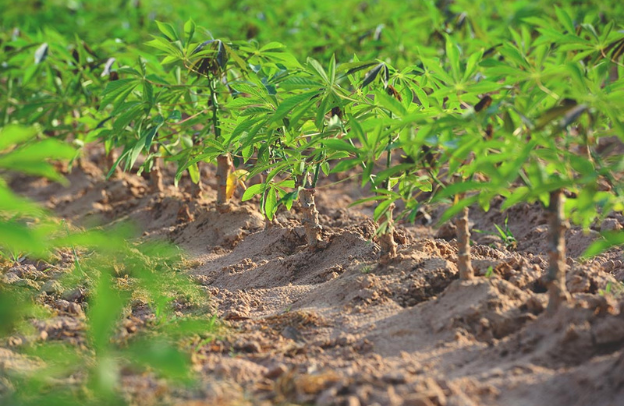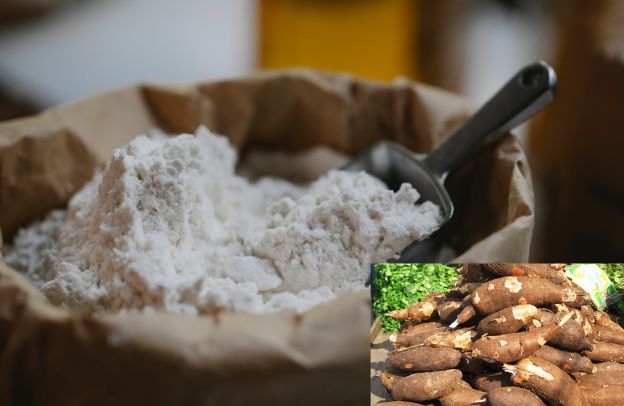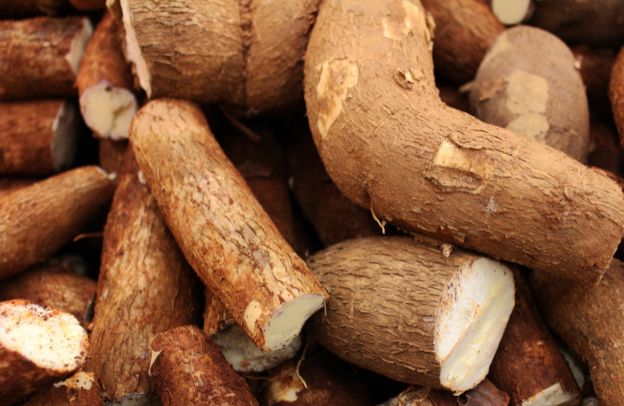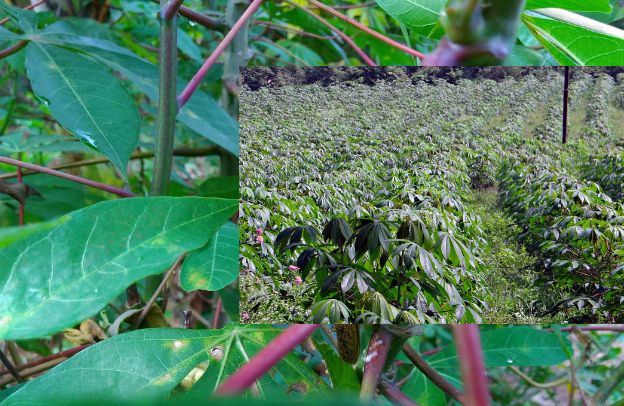Cassava and Climate Change: How This Crop Can Help Build Resilience

Imagine a crop so resilient that it thrives in poor soil, survives extreme heat, and even grows when rainfall is erratic. A crop that feeds over 800 million people worldwide and plays a vital role in Africa’s food security. Now, imagine that this same crop, cassava, remains underutilized as a cash crop and industrial raw material in Nigeria, despite the country being the world’s largest producer.
Take your Business Storytelling to the next level through our Story To Asset Transformation Framework.
What if you, as part of the African diaspora, could change this?
Cassava is more than just a staple food, it is a billion-dollar agribusiness opportunity waiting to be unlocked. In a world where climate change threatens food production and economic instability persists, cassava stands out as a game-changer for smallholder farmers, agripreneurs, and investors alike.
The question is: How can cassava be leveraged to fight food insecurity, generate wealth, and create sustainable jobs in Nigeria and beyond?
Climate Change and the Agricultural Crisis in Nigeria
A Looming Food Security Challenge. The impact of climate change on agriculture is undeniable. Rising temperatures, unpredictable rainfall, and extreme weather events are wreaking havoc on staple crops. According to the Food and Agriculture Organization, climate change could slash Nigeria’s agricultural productivity by up to 30% by 2050.
Small and medium-scale farmers, who produce over 80% of Nigeria’s food supply, are particularly vulnerable. With declining yields of maize, rice, and other staples, the risk of food shortages, malnutrition, and economic distress is growing.
Cassava: Africa’s Resilient Root Crop
Unlike other staple crops, cassava thrives in harsh conditions. It grows in poor soils, tolerates high temperatures, and requires minimal water, making it a lifeline for farmers facing erratic weather.
A study by the International Center for Tropical Agriculture (CIAT) predicts that cassava yields in Africa will remain stable or even increase slightly by 2050, making it one of the most climate-resilient crops on the continent.
See also Cassava Farming: A Gateway to Profitable Agribusiness for the African Diaspora
Cassava’s ability to store underground for up to two years without spoiling also gives farmers flexibility, reducing post-harvest losses, a critical advantage in a changing climate.
The Economic and Industrial Potential of Cassava
Nigeria: A Global Leader in Cassava Production, Yet an Underperformer
Nigeria produces over 60 million metric tons of cassava annually, making it the largest producer in the world (FAO, 2023). However, the country captures only a fraction of the $10 billion global cassava market due to poor processing capacity and limited industrial utilization.
Cassava: A High-Value Crop Driving Global Agribusiness
Cassava is a nutrient-rich, multipurpose crop with applications across four key sectors:
- Food – A staple feeding millions globally
- Feed – A crucial component in animal nutrition
- Fuel – A source of ethanol for bioenergy
- Factories – A raw material in the production of alcohol, citric acid, textiles, pharmaceuticals, paper, and chemicals
Surging Global Demand for Cassava
With its wide industrial applications and cost-effectiveness, cassava has become the world’s fifth most important crop, following corn, wheat, rice, and potatoes. Its demand continues to rise, driven by its role in food security, renewable energy, and industrial manufacturing.
As of 2020, global cassava production reached 303 million tonnes, with Africa contributing 64% of total output. Other major producing regions include Asia (27%), the Americas (8.9%), and Oceania (0.1%).
Nigeria: The Global Leader in Cassava Production
Nigeria holds the top position in global cassava production, accounting for 19.8% of total output. Other leading producers include:
- Democratic Republic of Congo (13.6%)
- Thailand (9.6%)
- Ghana (7.2%)
- Indonesia (6.1%)
- Brazil (6.0%)
In recent years, Vietnam and Cambodia have emerged as rising cassava producers, fueled by investment from Thai and Chinese agribusinesses.
Cassava’s Expanding Market Potential
For African diaspora entrepreneurs, cassava presents profitable investment opportunities across multiple value-added segments:
- Cassava Flour – A gluten-free alternative to wheat, with strong global demand
- Starch and Ethanol – Essential in pharmaceuticals, textiles, paper production, and biofuels
- Animal Feed – A key input in Nigeria’s growing livestock industry
- Biodegradable Plastics – A sustainable alternative to petroleum-based plastics, attracting global interest
By investing in cassava processing and agribusiness, the African diaspora can tap into lucrative markets, drive food security, and support job creation while positioning Nigeria as a global leader in value-added cassava exports.
See also: Harvesting and Storing Cassava: Tips for Nigerian Farmers
How Small and Medium-Scale Farmers Can Thrive with Cassava
Climate-Smart Cassava Farming
To maximize productivity, farmers need to adopt improved cassava varieties and modern agricultural techniques. The International Institute of Tropical Agriculture (IITA) has developed high-yielding, disease-resistant cassava varieties that can increase yields by up to 50%.
Best practices for cassava farming include:
- Planting drought-resistant cassava varieties such as TME 419 and NR 8082.
- Using intercropping techniques to improve soil fertility and reduce pest outbreaks.
- Applying organic fertilizers to enhance soil nutrients and boost yields.
- Adopting mechanized farming to reduce labor intensity and increase efficiency.
Scaling Processing and Storage Capacity
One of the biggest challenges in Nigeria’s cassava value chain is post-harvest losses, which can reach 40% due to inadequate storage and poor processing infrastructure.
Solutions include:
- Establishing cassava processing hubs to convert fresh tubers into flour, starch, and ethanol.
- Investing in solar-powered storage systems to preserve cassava for extended periods.
- Encouraging cooperative models where smallholder farmers pool resources for collective processing and marketing.
Strengthening Market Access and Export Channels
To maximize profits, farmers must connect with reliable buyers and explore export opportunities.
Key strategies include:
- Joining agribusiness cooperatives to negotiate better pricing and supply agreements.
- Partnering with food and beverage companies that require cassava-based raw materials.
- Leveraging e-commerce and digital marketplaces to reach international buyers.
See also: Cassava Farming: A Gateway to Profitable Agribusiness for the African Diaspora
The Role of the African Diaspora: Driving Cassava Agribusiness Forward
The African diaspora is uniquely positioned to drive agribusiness development in Nigeria, particularly in the cassava value chain. With a combination of financial resources, technological expertise, global market access, and policy influence, diaspora entrepreneurs and investors can transform cassava from a subsistence crop into a thriving industrial commodity.
By strategically deploying resources into cassava cultivation, processing, and trade, the diaspora can reduce food insecurity, generate employment, and strengthen economic ties between Africa and the global market.
Below are three key ways the African diaspora can catalyze cassava agribusiness growth.
Financing Agribusiness Growth
One of the biggest barriers to cassava industrialization in Nigeria is limited access to finance. Small and medium-scale farmers struggle to secure the capital needed for improved seeds, mechanization, and processing facilities, restricting their productivity and profitability. This is where the African diaspora can play a transformative role.
Leveraging Remittances for Agribusiness Growth
Remittances have become a major financial lifeline for many low- and middle-income countries (LMICs). According to the World Bank, global remittance flows to LMICs reached an estimated $669 billion in 2023, a sum that surpasses the total foreign direct investment (FDI) into Africa. While most of these funds support household expenses, only a small percentage is directed toward productive investments like agribusiness.
If even 5% of diaspora remittances were allocated to cassava farming, processing, and export, it could unlock a multi-billion-dollar industry, driving:
- Increased cassava production and value addition
- Expansion of local and international markets
- Creation of thousands of rural jobs
- Strengthening Nigeria’s position as a global cassava leader
Turning Remittances into Investment Capital
To harness this opportunity, innovative diaspora investment models—such as agribusiness cooperatives, pooled funding platforms, and government-backed incentives—can channel remittances into scalable, high-impact agricultural ventures.
With the right policies and investment frameworks, Nigeria’s cassava industry can move beyond subsistence farming to become a global powerhouse in food, bioethanol, and industrial starch production—driven by the strategic participation of the African diaspora.
Diaspora-Led Agribusiness Investment Funds
To facilitate structured investment, the African diaspora can pool resources into agribusiness funds that finance:
- Cassava processing factories in rural areas.
- Mechanized farming equipment for smallholder farmers.
- Research and development (R&D) into high-yield cassava varieties.
African-led investment firms such as AfricInvest and GroAfrica have already launched initiatives to support agribusiness, but a diaspora-driven cassava investment network could further accelerate this growth.
Venture Capital and Crowdfunding for Agripreneurs
African diaspora entrepreneurs can establish venture capital funds that provide loans and equity investments to high-potential cassava businesses. Additionally, platforms like ThriveAgric and Farmcrowdy have demonstrated the power of crowdfunding in agriculture, allowing individuals to invest in farms remotely and receive returns after harvest.
By channeling capital into cassava enterprises, the diaspora can unlock wealth creation opportunities for millions of Nigerians, while also benefiting from high-return agribusiness investments.
Technology and Innovation in Cassava Farming
While cassava is naturally resilient, maximizing its potential requires technological advancements in precision agriculture, processing, and logistics. The African diaspora, with its exposure to global innovation, can introduce cutting-edge agricultural technology to transform Nigeria’s cassava industry.
AI and Data-Driven Farming
Artificial intelligence (AI) and machine learning can help predict climate patterns, detect diseases, and optimize yields. Diaspora agritech entrepreneurs can introduce:
- AI-powered weather forecasting tools to help farmers plan planting seasons.
- Drone technology to monitor cassava farms and detect pests.
- Soil health sensors that recommend fertilizer application based on real-time data.
These innovations can reduce losses, improve productivity, and make cassava farming more profitable.
Blockchain for Supply Chain Transparency
One of the biggest challenges in Nigeria’s agricultural sector is market inefficiency and lack of transparency. Many smallholder farmers struggle to sell their produce at fair prices due to middlemen. Blockchain technology can provide:
- Smart contracts that ensure fair payments for farmers.
- Real-time tracking of cassava from farm to factory.
- Certification for export markets, ensuring compliance with international standards.
Blockchain-powered platforms like Twiga Foods (Kenya) and AgriLedger (Ghana) have already improved supply chain efficiency. A diaspora-led blockchain initiative for Nigeria’s cassava sector could significantly enhance profitability.
Mechanization and Smart Processing
Unlike Asia and Latin America, where
cassava farming is mechanized, over 90% of cassava in Nigeria is still cultivated manually (FAO, 2023). The African diaspora can introduce modern equipment, such as:
- Cassava planters and harvesters to improve efficiency.
- Automated peeling and drying machines to scale processing.
- Solar-powered cassava processing units to reduce post-harvest losses.
By leveraging technology, diaspora-led initiatives can help move Nigeria’s cassava industry from subsistence farming to large-scale agribusiness.
Policy Advocacy and Trade Facilitation
Policy and regulatory environments directly impact the growth of agribusiness. The African diaspora, particularly those engaged in international trade and governance, can influence policies that improve cassava industrialization and exports.
Pushing for Agriculture-Friendly Policies
Nigeria’s agricultural policies often favor short-term interventions rather than long-term industrialization. The African diaspora can lobby for policies that support cassava value addition, such as:
- Tax incentives for cassava processors and exporters.
- Subsidized loans for agribusiness startups.
- Land reforms that enable large-scale commercial cassava farming.
Through diaspora advocacy groups and business chambers, Nigerians abroad can push for government-backed agribusiness funding, similar to what has been successful in Ethiopia and Rwanda.
Improving Infrastructure for Agribusiness
One of the key reasons why cassava remains under-commercialized in Nigeria is poor infrastructure. The African diaspora, particularly those in engineering and logistics, can collaborate with the government to improve:
- Rural road networks, reducing transportation costs.
- Irrigation systems, ensuring year-round cassava farming.
- Processing hubs, enabling cassava to be converted into flour, starch, and ethanol at scale.
Building Diaspora-Led Agribusiness Cooperatives
Diaspora-led agribusiness cooperatives can bridge the gap between international investors and local farmers. These cooperatives can:
- Negotiate trade agreements for cassava exports.
- Facilitate partnerships between Nigerian agripreneurs and foreign agribusiness firms.
- Create shared processing facilities that smallholder farmers can access at lower costs.
Successful diaspora agribusiness cooperatives already exist in Ghana and Kenya, Nigeria should be next.
Expanding Cassava into Global Markets
Cassava is a multi-billion-dollar global commodity, yet Nigeria captures less than 5% of the international market. The African diaspora can:
- Help Nigerian cassava products meet export quality standards for the U.S., EU, and Asian markets.
- Develop cassava-based brands for the global food and industrial sectors.
- Leverage international trade networks to boost cassava exports.
With strong trade agreements and marketing strategies, Nigeria could rival Thailand as a global cassava export powerhouse.
Conclusion: A Call to Action for the African Diaspora
The cassava revolution is already unfolding, and you have a role to play. Whether you are an entrepreneur, investor, policymaker, or technology expert, your contribution can help transform cassava from a subsistence crop into a multi-billion-dollar industry.
- Are you ready to finance the next generation of agripreneurs?
- Can you introduce technology that revolutionizes cassava farming?
- Will you push for policies that enable Nigeria to dominate global cassava trade?
The potential is vast, the opportunities are limitless, and the impact is profound.
The Future of Cassava: A Call to Action
Cassava is more than just a staple food, it is a resilient, high-value crop with the potential to transform Nigeria’s agribusiness sector.
By adopting climate-smart farming, investing in industrial processing, and improving market access, small and medium-scale farmers can turn cassava into a wealth-generating commodity.
For African diaspora entrepreneurs, the time to act is now. Whether through investment, innovation, or policy advocacy, you can play a pivotal role in shaping the future of Nigeria’s agribusiness landscape. Will you seize the opportunity and be part of Africa’s agricultural revolution?
Take your Business Storytelling to the next level through our Story To Asset Transformation Framework.





